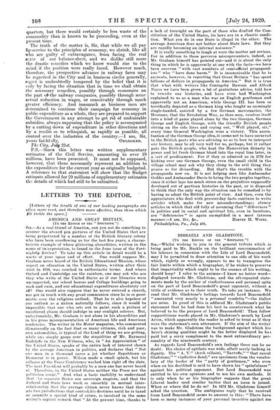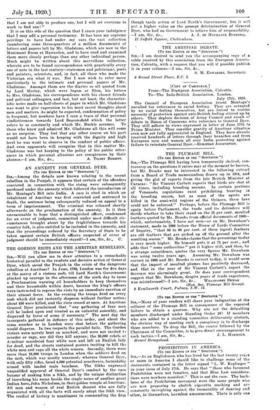DISRAELI AND GLADSTONE.
[To THE EDITOR OF THE "SPECTATOR.") SIR,—Whilst wishing to join in the general tribute which is being paid to Mr. Buckle on the brilliant consummation of his labours in connexion with the Life of Lord Beaconsfield, may I be permitted to draw attention to one side of his work which, rightly or wrongly, appears to me to transgress the fair limits within which a biographer, if he wishes to preserve that impartiality which ought to be the essence of his writing, should keep? I refer to the animus—I know no better word— displayed towards Mr. Gladstone, and the oft-repeated state- ments made by the author of vindictiveness and personal spite on the part of Lord Beaconsfield's great opponent, without a tittle of evidence as to their truth. To take an instance. We read that Mr. Gladstone's feelings towards Lord Beaconsfield "amounted very nearly to a personal vendetta "—the italics are mine. In proof of this is adduced Mr. Gladstone's public statement that he had done his best to counterwork what he believed to be the purpose of Lord Beaconsfield! Then follow supposititious words placed in Mr. Gladstone's mouth by Lord Acton, which apparently the reader is asked to treat as if .they were the statesman's own utterances. If the aim of the writer was to make Mr. Gladstone the background against which his hero's shining qualities might be the better displayed he ha s paid but a sorry compliment to the most extraordinary per- sonality of the nineteenth century.
As regards Lord Beaconsfield's own feelings there can be no doubt. His choice of epithets was wide, albeit sorely-lacking in dignity. The "A. V." (Arch villain), "Tartuffe," "that rascal Gladstone," "vindictive fiend," are specimens from the vocabu- lary of the leader of the "party of gentlemen," who even when on his deathbed is said to have shown his " spitefulness " against his political opponent. But Lord Beaconsfield was entitled to his own opinions and to use his own methods. It is only when he or his biographer suggests that the great Liberal leader used similar tactics that an issue is joined. When or where did he do so? In 1873 Mr. Gladstone himself asked the question. The ambiguous reply that he received from Lord Beaconsfield seems to amount to this: "There have been so many instances of your personal invective against me
that I am not ablp to produce one, but I will set everyone to work to find one!"
It is on this side of the question that I crave your indulgence that I may add a personal testimony. It has been my supreme privilege to have had under my care the vast collection (numbering some three-quarters of a million documents) of letters and papers left by Mr. Gladstone, which are now in the Muniment Room at Hawarden, and to have read and examined them more closely perhaps than any other individual person. Much might be written about this marvellous collection, wherein are to be found correspondence with practically every one of note in the last century—statesmen and politicians, poets and painters, scientists, and, in fact, all those who made the Victorian era what it was. But I now wish to refer more particularly to the intimate and personal papers of Mr. Gladstone. Amongst them are the diaries so oft quoted from by Lord Morley, which were begun at Eton, his letters to Mrs. Gladstone, his correspondence with his closest friends and political colleagues, and last, but not least, the character- istic notes made on half-sheets of paper in which Mr. Gladstone was wont to give expression to his most secret thoughts about men and matters. As might be expected, condemnation of policy is frequent, but nowhere have I seen a trace. of that personal vindictiveness towards Lord Beaconsfield which the latter refers to so constantly and which Mr. Buckle assumes. To those who knew and admired Mr. Gladstone all this will come as no surprise. They feel that any other course on his part would not have been in keeping with the dignity and high level he was wont to observe in the conduct of public affairs. And even opponents will recognize that in this matter Mr. Gladstone was but keeping to the policy of his public utter- ances in which personal allusions are conspicuous by their



































 Previous page
Previous page